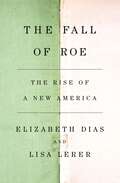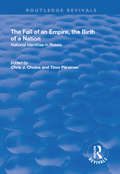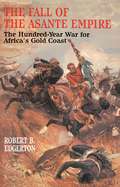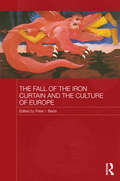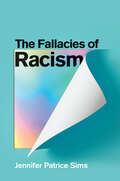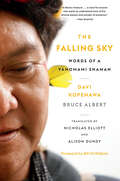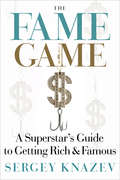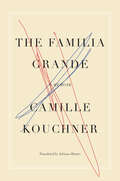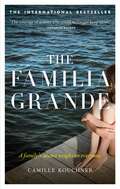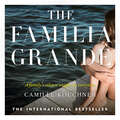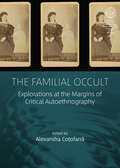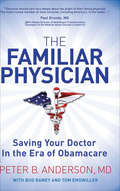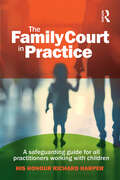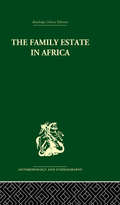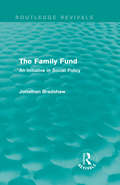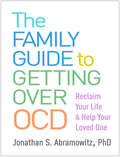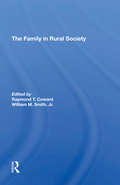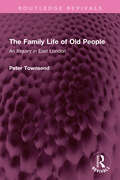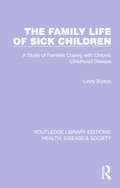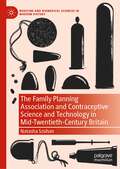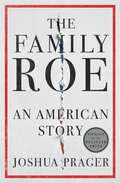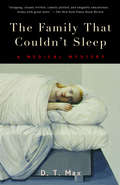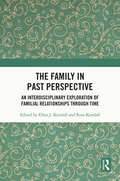- Table View
- List View
The Fall of Roe: The Rise of a New America
by Elizabeth Dias Lisa LererNATIONAL BESTSELLERThe "Best and Most Current Primer" - The New York Times"Searing and intimate... with masterly, white-hot reporting." – The New York Times“The most important book in this election.” – Nicolle Wallace, MSNBC“As Dias and Lerer write, the fight against legal abortion is tied inextricably to the fight for America’s soul.” – New York Magazine“A tour de force. However you read books, hardcover, ebook, audio… Just read it.” – Alex Wagner on Alex Wagner TonightFrom two top New York Times journalists, the “searing and intimate” untold story of the plan to overturn Roe v. Wade and the consequences for women and abortion, charting the rise of this new America with “masterly white hot reporting." In June 2022, Americans watched in shock as the Supreme Court reversed one of the nation’s landmark rulings. For nearly a half century, Roe was synonymous with women’s rights and freedoms. Then, suddenly, it was gone.In their groundbreaking book The Fall of Roe, Elizabeth Dias and Lisa Lerer reveal the explosive inside story of how it happened. Their investigation charts the shocking political and religious campaign to take down abortion rights and remake American families, womanhood, and the nation itself. In doing so, Dias and Lerer go beyond the traditional political narrative into the most personal reaches of American life.Reeling from Barack Obama's 2012 landslide presidential victory – and motivated by a spiritual mission – a small but determined network of elite conservative Christian lawyers and powerbrokers worked quietly and methodically to keep their true cause alive: ending abortion rights. Thinking in generational terms, they devised a strategic, top-down takeover at every level of political and legal life, from little-known anti-abortion lobbyists in far flung statehouses to the arbiters of the constitution at the highest court in the land. Broad swaths of liberal America did not register the severity of the threat until it was far too late. At a moment when women had more power than ever before, the feminist movement suffered one of the greatest political defeats in American history.With stunning scope, journalistic rigor, and unprecedented access to the highest echelons of conservative and liberal power, Dias and Lerer chronicle the end of the Roe era. Their deeply human reporting stretches from inside abortion clinics to the halls of the White House, exposing powerful behind-the-scenes actors and recasting the actions of those already in the spotlight. The result is a sweeping and intimate narrative of secrets, power, jaw-dropping revelations, and a guide for affecting long term political change as we look to what’s ahead.
The Fall of an Empire, the Birth of a Nation: National Identities in Russia
by CHRIS J. CHULOS and TIMO PIIRAINENThis title was first published in 2000: A collection of articles by Russian and Western experts on nationalism. The objective of the work is to give an overview of the new Russian identity-building and of the historical continuities that lie behind this ongoing process. The main theme is the shift from empire and imperial consciousness, characteristic both of the imperial Russia and the Soviet Union, towards a new identity as a nation state. Ultra-nationalism and the threat posed by ultra-right extremists groups is also among the most important themes in the book. The rising nationalist extremism is one of the several major projects that seek to redefine the Russion nationhood. The ultra-nationalist challenge is examined in several articles; the anatomy of extreme Russian nationalism is also examined through a case study of a small militant group of extremists.
The Fall of the Asante Empire: The Hundred-year War for Africa's Gold Coast
by Robert B. EdgertonIn 1817, the first British envoy to meet the king of the Asante of West Africa was dazzled by his reception. A group of 5,000 Asante soldiers, many wearing immense caps topped with three foot eagle feathers and gold ram's horns, engulfed him with a "zeal bordering on phrensy," shooting muskets into the air. The envoy was escorted, as no fewer than 100 bands played, to the Asante king's palace and greeted by a tremendous throng of 30,000 noblemen and soldiers, bedecked with so much gold that his party had to avert their eyes to avoid the blinding glare. Some Asante elders wore gold ornaments so massive they had to be supported by attendants. But a criminal being lead to his execution - hands tied, ears severed, knives thrust through his cheeks and shoulder blades - was also paraded before them as a warning of what would befall malefactors. " "This first encounter set the stage for one of the longest and fiercest wars in all the European conquest of Africa. At its height, the Asante empire, on the Gold Coast of Africa in present-day Ghana, comprised three million people and had its own highly sophisticated social, political, and military institutions. Armed with European firearms, the tenacious and disciplined Asante army inflicted heavy casualties on advancing British troops, in some cases defeating them. They won the respect and admiration of British commanders, and displayed a unique willingness to adapt their traditional military tactics to counter superior British technology. Even well after a British fort had been established in Kumase, the Asante capital, the indigenous culture stubbornly resisted Europeanization, as long as the "golden stool," the sacred repository of royal power, remained in Asante hands. It was only after an entire century of fighting that resistance ultimately ceased.--BOOK JACKET. Title Summary field provided by Blackwell North America, Inc. All Rights Reserved
The Fall of the Iron Curtain and the Culture of Europe (Routledge Contemporary Russia and Eastern Europe Series)
by Peter I. BartaThe end of communism in Europe has tended to be discussed mainly in the context of political science and history. This book, in contrast, assesses the cultural consequences for Europe of the disappearance of the Soviet bloc. Adopting a multi-disciplinary approach, the book examines the new narratives about national, individual and European identities that have emerged in literature, theatre and other cultural media, investigates the impact of the re-unification of the continent on the mental landscape of Western Europe as well as Eastern Europe and Russia, and explores the new borders in the form of divisive nationalism that have reappeared since the disappearance of the Iron Curtain.
The Fallacies of Racism: Understanding How Common Perceptions Uphold White Supremacy
by Jennifer Patrice SimsEveryone has an opinion on racism. The vast majority of people would vehemently deny that they or those close to them are “racist,” yet many of the most common understandings of racism are highly problematic. “If you mean no harm, then it can’t be racist.” Yes, it can. “There are anti-discrimination laws now, so racism no longer occurs.” Incorrect. “Some of my best friends are Black, so I can’t be racist.” Not true. In this sharp, open-minded, and witty book, sociologist Jennifer Patrice Sims succinctly addresses these problematic perceptions of racism as fallacies. Building on existing academic theories and drawing on her own cross-national research, two decades of teaching, and analyses of contemporary issues, she delves into the most common and insidious fallacies about racism. In revealing them to be rooted in what scholars call an “epistemology of ignorance,” she shows how these perceptions justify and uphold white supremacy (inadvertently or otherwise).Accessibly written and full of concrete examples, this book will be of great value to anyone who wants to understand the common misunderstandings about racism that frustrate contemporary politics, classrooms, workplaces, and dinner tables.
The Falling Sky: Words of a Yanomami Shaman
by Davi Kopenawa Bruce AlbertThe 10th anniversary editionA Guardian Best Book about DeforestationA New Scientist Best Book of the YearA Taipei Times Best Book of the Year“A perfectly grounded account of what it is like to live an indigenous life in communion with one’s personal spirits. We are losing worlds upon worlds.”—Louise Erdrich, New York Times Book Review“The Yanomami of the Amazon, like all the indigenous peoples of the Americas and Australia, have experienced the end of what was once their world. Yet they have survived and somehow succeeded in making sense of a wounded existence. They have a lot to teach us.”—Amitav Ghosh, The Guardian“A literary treasure…a must for anyone who wants to understand more of the diverse beauty and wonder of existence.”—New ScientistA now classic account of the life and thought of Davi Kopenawa, shaman and spokesman for the Yanomami, The Falling Sky paints an unforgettable picture of an indigenous culture living in harmony with the Amazon forest and its creatures, and its devastating encounter with the global mining industry. In richly evocative language, Kopenawa recounts his initiation as a shaman and first experience of outsiders: missionaries, cattle ranchers, government officials, and gold prospectors seeking to extract the riches of the Amazon.A coming-of-age story entwined with a rare first-person articulation of shamanic philosophy, this impassioned plea to respect indigenous peoples’ rights is a powerful rebuke to the accelerating depredation of the Amazon and other natural treasures threatened by climate change and development.
The Fame Game: A Superstar's Guide to Getting Rich & Famous
by Perez Hilton Sergey KnazevStarting today, you no longer have to live through the gossip news of your favorite celebrities because you can turn your own life into the same star-driven celebrity marketing machine through The Fame Game. Seen through the eyes of an experienced Hollywood talent manager, The Fame Game will guide readers past the carefully crafted public relations images splashed across the pages of their favorite tabloids to reveal how today's hottest celebrities live, thrive, and flourish in the glamorous world of show business where the cameras are always on, the fans' gossip ricochets through all the popular social media networks, and the money flows in multi-million dollar deals based on nothing more than notoriety instead of talent. If you want to learn how Hollywood really works and how you can use the techniques of show business to market yourself into the next Hollywood sensation or just to promote yourself within your own line of work, you need to learn the secrets told in The Fame Game.
The Fame Game: A Superstar's Guide to Getting Rich and Famous
by Sergey KnazevHollywood is where even the wildest dreams can come true no matter who you are, where you come from, or even what you know. In Hollywood, everyone is a potential star and newsstands overflow with gossip about the latest celebrity mishaps, conflicts, and achievements so that millions can live vicariously through the lives of their favorite movie stars.
The Familia Grande: A Memoir
by Camille KouchnerA stunning story about finding the courage to speak out against injustice, even when committed by those closest to us.Camille Kouchner&’s childhood was marked by sun-drenched summers in the south of France, where a vibrant cast of family and friends would gather at their Sanary-sur-Mer house. This familia grande, which included much of the country&’s elite, spent memorable days and nights laughing, debating, drinking, and dancing. But a long-held secret poisoned Camille&’s memories. In February 2017, Camille returned to Sanary at forty-one to bury her mother, who died with none of her five children present. Her passing would stir up old emotions, ultimately leading Camille to publicly confront the truth. The Familia Grande poignantly explores the dynamics of abuse, and the questions of guilt and shame surrounding it. Published in France in 2021, the book sparked an important conversation about incest, and the attitudes and laws that have so often allowed influential men to evade consequences for their crimes.
The Familia Grande: A family's silence weighs on everyone
by Camille KouchnerTHE LITERARY SENSATION THAT STORMED THE WORLD, THE PHENOMENAL FRENCH BESTSELLER HAS SOLD 350,000 COPIESTHE BOOK THAT SPARKED THE VIRAL #METOOINCEST MOVEMENTA family's secret weighs on everyone...THE FAMILIA GRANDE is a tender, groundbreaking and lacerating memoir written by a sister who could no longer remain silent...Set in amongst the French intellectual elite in Paris and their lavender scented estates in Provence, it tells a story of a corrosive secret that sits in a family for decades and ultimately razes it and the political, literary elite that enabled its silence, to the ground.Already an international bestseller, it has touched a nerve across the globe and has brought about a powerful reckoning of incest, and its far-reaching trauma.The Familia Grande is a book of a generation.'The courage of a sister who could no longer keep quiet.' - EMMANUEL MACRON 'Camille's battle to liberate herself from a painful family secret has touched a nerve across France' - THE NEW YORK TIMES
The Familia Grande: A family's silence weighs on everyone
by Camille KouchnerTHE LITERARY SENSATION THAT STORMED THE WORLD,THE PHENOMENAL FRENCH BESTSELLER HAS SOLD 350,000 COPIESTHE BOOK THAT SPARKED THE VIRAL #METOOINCEST MOVEMENTA family's secret weighs on everyone...THE FAMILIA GRANDE is a tender, groundbreaking and lacerating memoir written by a sister who could no longer remain silent...Set in amongst the French intellectual elite in Paris and their lavender scented estates in Provence, it tells a story of a corrosive secret that sits in a family for decades and ultimately razes it and the political, literary elite that enabled its silence, to the ground.Already an international bestseller, it has touched a nerve across the globe and has brought about a powerful reckoning of incest, and its far-reaching trauma.The Familia Grande is a book of a generation.'The courage of a sister who could no longer keep quiet.' - EMMANUEL MACRON'Camille's battle to liberate herself from a painful family secret has touched a nerve across France' - THE NEW YORK TIMES(p) 2022 Octopus Publishing Group
The Familial Occult: Explorations at the Margins of Critical Autoethnography (EASA Series #47)
by Alexandra CoţofanăThe Familial Occult addresses the presence of occult experiences in some scholars' families and how that has affected their epistemological and ontological worlds, as well as their identities as scholars. Those with backgrounds in the familial occult often experience a series of conflicting relationships and different ways of interacting with binaries such as the subjective and objective, a powerful conceptual couple still governing academic thinking. While much has been written on encountering the occult in fieldwork or becoming an apprentice in an occult practice, little yet has been published in the academic literature about growing up with the occult.
The Familiar Physician: Saving Your Doctor In the Era of Obamacare
by Bud Ramey Tom Emswiller Peter B. AndersonPowerful forces of change are at the core of Obamacare—and they could either strengthen or destroy our family doctors. It’s a perfect storm that threatens our hope for more effective and personalized medical care and it holds the potential to drive our trusted Familiar Physicians toward extinction. In the midst of the storm is a new and promising approach within Obamacare called the medical home. Learn what you can do to help assure that the Familiar Physician, the basis for a strong physician-patient relationship, survives the approaching storm. On a national level, there are heroes here—doctors who redirected their lives to make this change happen. Not just for a few months, but for a decade-long crusade. This is the story of Dr. Peter Anderson, a pioneer in team care medicine and a passionate champion for primary care. The Familiar Physician is about the extraordinary vision of IBM’s Dr. Martin Sepúlveda and the powerful crusade of advocacy carried out by IBM’s Dr. Paul Grundy. Their ten-year quest to create solutions for this crisis in primary care has powerful outcomes. Hope is on the horizon, but the struggle is far from over.
The Family Court in Practice: A safeguarding guide for all practitioners working with children
by Richard HarperWritten by an experienced former senior judge of the family court, this practical guide provides all students and practitioners working with children with a clear understanding of safeguarding good practice and the principles and proceedings of the family court.Where there is serious risk of harm, it examines how all involved in the community or family court proceedings can place the child at the centre of their practical decision-making. Incorporating the most up-to-date legislation, and emphasising the importance of multi-agency working, the book enables practitioners, and all stakeholders, to better understand the workings of the family court and to recognise and implement appropriate actions. Fictional case studies with critical questions are included to encourage deep reflection and ways to apply new-found knowledge to practice. The book demystifies the family court to provide an accessible guide for students and both experienced and newly qualified practitioners.Chapters delve into the structure of the family court, preparing reports and statements, public and private court proceedings, giving evidence, and urgent interventions. The author's professional experience and expertise ensures readers are fully equipped with a unique and practical understanding for safeguarding the welfare of children within the family court system.
The Family Estate in Africa: Studies in the Role of Property in Family Structure and Lineage Continuity
by Robert F Gray Ρ Η GulliverToo often accounts of African family life have tended to describe the family in purely static terms. The contributors to this book emphasize the developmental or time dimension of the family, analysing it as a process. In the seven different societies described in East Africa, the Congo and the Transvaal the changing nature of the distribution of rights in the family property and resources is directly linked with the growth and change of the family itself. First published in 1964.
The Family Fund: An Initiative in Social Policy (Routledge Revivals)
by Jonathan BradshawIn The Family Fund, first published in 1980, Bradshaw discusses the introduction of The Family Fund- a grant given to families in response of the discovery of the damages caused by the Thalidomide drug. He examines all aspects of the Fund including its origins, aims, publicity and its future. This text is ideal for students of sociology.
The Family Guide to Getting Over OCD: Reclaim Your Life and Help Your Loved One
by Jonathan S. AbramowitzWhen a loved one has OCD, it's a constant struggle. It hurts to see your spouse so anxious or your teen spending so much time alone. You've tried logic, reassurance, even accommodating endless rituals--but, too often, these well-meaning attempts actually make OCD worse. Psychologist Jonathan Abramowitz has worked with countless families affected by OCD, and he understands the strain. He also knows you can turn things around. Grounded in state-of-the-art treatment research, this compassionate guide helps you change your own behavior to support your loved one's recovery. By gently but firmly encouraging the person you care about to face their fears, you can stop being controlled by the disorder, disentangle yourself from unhealthy patterns, and see your whole family grow more confident and hopeful. Vivid stories, dos and don'ts, and practical tools (which you can download and print for repeated use) help you follow the step-by-step strategies in this life-changing book.
The Family In Rural Society
by Raymond T Coward William M Smith Peter L Heller Louis A PlochSocial and political attention often is focused on urban issues, neglecting the still-rural character of much of the United States. This volume of original papers provides a clear picture of present-day rural society, with special emphasis on the changing role and structure of the family. It describes demographic trends, discusses the family aspects of the new wave of inmigrants to small towns and rural communities, reviews the diversity of patterns and forms adopted by rural families, considers the plight of the rural aged, and explores the dynamics of intrafamily personal relationships. The book ends with speculations on future prospects and challenges facing rural families.
The Family Life of Old People: An Inquiry in East London (Routledge Revivals)
by Peter TownsendFirst published in 1957, The Family Life of Old People opens with the question: Are old people isolated from their families? Thereafter, the author describes the results of intensive interviews with people of pensionable age in Bethnal Green in East London. Part one shows that most people are members of closely-knit extended families of three generations, often living in separate households in adjoining streets. The life of these families is of absorbing interest and the social structure of the home, the system of family care and the domestic, economic and social relationships between husbands and their wives, and between old people and their children and brothers and sisters, are carefully analysed. Part two discusses the social problems of old age against this background. This book will be of interest to students of sociology and gerontology.
The Family Life of Sick Children: A Study of Families Coping with Chronic Childhood Disease (Routledge Library Editions: Health, Disease and Society #8)
by Lindy BurtonOriginally published in 1975, this book traces the problems which arise for families coping with a chronic childhood disease – cystic fibrosis. The discussion of these problems is important for the families of other seriously ill or disabled children, all of whom are faced with similar implications of their situation. The book looks at the stressful situations which face them: mastering the child’s treatment technique, assisting them to come to terms with their disease. It deals with the practical problems which arise for the parents and siblings of a sick child and explores the profound repercussions of the loss of a child on the entire family, considering the ways in which many of these families managed to transcend their problems.
The Family Planning Association and Contraceptive Science and Technology in Mid-Twentieth-Century Britain (Medicine and Biomedical Sciences in Modern History)
by Natasha SzuhanThis book offers the first in-depth investigation into the relationship between the National Birth Control Association, later the Family Planning Association, and contraceptive science and technology in the pre-Pill era. It explores the Association’s role in designing and supporting scientific research, employment of scientists, engagement with manufacturers and pharmaceutical companies, and use of its facilities, patients, staff, medical, scientific, and political networks to standardise and guarantee contraceptive technology it prescribed and produced. By taking a micro-history approach to the archives of the Association, this book highlights the importance of this organisation to the history of science, technology, and medicine in twentieth-century Britain. It examines the Association’s participation within Western family planning networks, working particularly closely with its American counterparts to develop chemical and biological means of testing contraception for efficacy, quality, and safety.
The Family Roe: An American Story
by Joshua PragerFinalist for the 2022 Pulitzer Prize for General Nonfiction Finalist for the J. Anthony Lukas Book Prize Finalist for the National Book Critics Circle Award for Nonfiction One of NPR's Best Books of 2021 A New York Times Notable Book of 2021 One of TIME's 100 Must-Read Books of 2021 "The scope is sweeping, the writing is beautiful. It’s an epic story worthy of the impact this one case has had on the American psyche." —Michel Martin, NPR "Stupendous…. If you want to understand Roe more deeply before the coming decision, read it." —Peggy Noonan, Wall Street Journal A masterpiece of reporting on the Supreme Court’s most divisive case, Roe v. Wade, and the unknown lives at its heart. Despite her famous pseudonym, “Jane Roe,” no one knows the truth about Norma McCorvey (1947–2017), whose unwanted pregnancy in 1969 opened a great fracture in American life. Journalist Joshua Prager spent hundreds of hours with Norma, discovered her personal papers—a previously unseen trove—and witnessed her final moments. The Family Roe presents her life in full. Propelled by the crosscurrents of sex and religion, gender and class, it is a life that tells the story of abortion in America. Prager begins that story on the banks of Louisiana’s Atchafalaya River where Norma was born, and where unplanned pregnancies upended generations of her forebears. A pregnancy then upended Norma’s life too, and the Dallas waitress became Jane Roe. Drawing on a decade of research, Prager reveals the woman behind the pseudonym, writing in novelistic detail of her unknown life from her time as a sex worker in Dallas, to her private thoughts on family and abortion, to her dealings with feminist and Christian leaders, to the three daughters she placed for adoption. Prager found those women, including the youngest—Baby Roe—now fifty years old. She shares her story in The Family Roe for the first time, from her tortured interactions with her birth mother, to her emotional first meeting with her sisters, to the burden that was uniquely hers from conception. The Family Roe abounds in such revelations—not only about Norma and her children but about the broader “family” connected to the case. Prager tells the stories of activists and bystanders alike whose lives intertwined with Roe. In particular, he introduces three figures as important as they are unknown: feminist lawyer Linda Coffee, who filed the original Texas lawsuit yet now lives in obscurity; Curtis Boyd, a former fundamentalist Christian, today a leading provider of third-trimester abortions; and Mildred Jefferson, the first black female Harvard Medical School graduate, who became a pro-life leader with great secrets. An epic work spanning fifty years of American history, The Family Roe will change the way you think about our enduring American divide: the right to choose or the right to life.
The Family That Couldn't Sleep: A Medical Mystery
by D. T. MaxFor two hundred years a noble Venetian family has suffered from an inherited disease that strikes their members in middle age, stealing their sleep, eating holes in their brains, and ending their lives in a matter of months. In Papua New Guinea, a primitive tribe is nearly obliterated by a sickness whose chief symptom is uncontrollable laughter. Across Europe, millions of sheep rub their fleeces raw before collapsing. In England, cows attack their owners in the milking parlors, while in the American West, thousands of deer starve to death in fields full of grass. What these strange conditions–including fatal familial insomnia, kuru, scrapie, and mad cow disease–share is their cause: prions. Prions are ordinary proteins that sometimes go wrong, resulting in neurological illnesses that are always fatal. Even more mysterious and frightening, prions are almost impossible to destroy because they are not alive and have no DNA–and the diseases they bring are now spreading around the world. In The Family That Couldn’t Sleep, essayist and journalist D. T. Max tells the spellbinding story of the prion’s hidden past and deadly future. Through exclusive interviews and original archival research, Max explains this story’s connection to human greed and ambition–from the Prussian chemist Justus von Liebig, who made cattle meatier by feeding them the flesh of other cows, to New Guinean natives whose custom of eating the brains of the dead nearly wiped them out. The biologists who have investigated these afflictions are just as extraordinary–for example, Daniel Carleton Gajdusek, a self-described “pedagogic pedophiliac pediatrician” who cracked kuru and won the Nobel Prize, and another Nobel winner, Stanley Prusiner, a driven, feared self-promoter who identified the key protein that revolutionized prion study. With remarkable precision, grace, and sympathy, Max–who himself suffers from an inherited neurological illness–explores maladies that have tormented humanity for centuries and gives reason to hope that someday cures will be found. And he eloquently demonstrates that in our relationship to nature and these ailments, we have been our own worst enemy.
The Family in Past Perspective: An Interdisciplinary Exploration of Familial Relationships Through Time
by Ellen J. Kendall Ross KendallThis volume takes a more comprehensive view of past familial dynamics than has been previously attempted. By applying interdisciplinary perspectives to periods ranging from the Prehistoric to the Modern, it informs a wider understanding of the term family, and the implications of family dynamics for children and their social networks in the past. Contributors drawn from across the humanities and social sciences present research addressing three primary themes: modes of kinship and familial structure, the convergence and divergence between the idealised image and realities of family life, and the provision of care within families. These themes are interconnected, as the idea and image of family shapes familial structure, which in turn defines the type of care and protection that families provide to their members. The papers in this volume provide new research to challenge assumptions and provoke new ways of thinking about past families as functionally adaptive, socially connected, and ideologically powerful units of society, just as they are in the present. A broad focus on the networks created by familial units also allows the experiences of historically underrepresented women and children to be highlighted in a way that underlines their interconnectedness with all members of past societies. The Family in Past Perspective builds a much-needed bridge across disciplinary boundaries. The wide scope of the book hmakes important contributions, and informs fields ranging from bioarchaeology to women's history and childhood studies.
The Family in Roman Egypt
by Sabine R. HuebnerThis study captures the dynamics of the everyday family life of the common people in Roman Egypt, a social strata that constituted the vast majority of any pre-modern society but rarely figures in ancient sources or in modern scholarship. The documentary papyri and, above all, the private letters and the census returns provide us with a wealth of information on these people not available for any other region of the ancient Mediterranean. The book discusses such things as family composition and household size and the differences between urban and rural families, exploring what can be ascribed to cultural patterns, economic considerations and/or individual preferences by setting the family in Roman Egypt into context with other pre-modern societies where families adopted such strategies to deal with similar exigencies of their daily lives.
